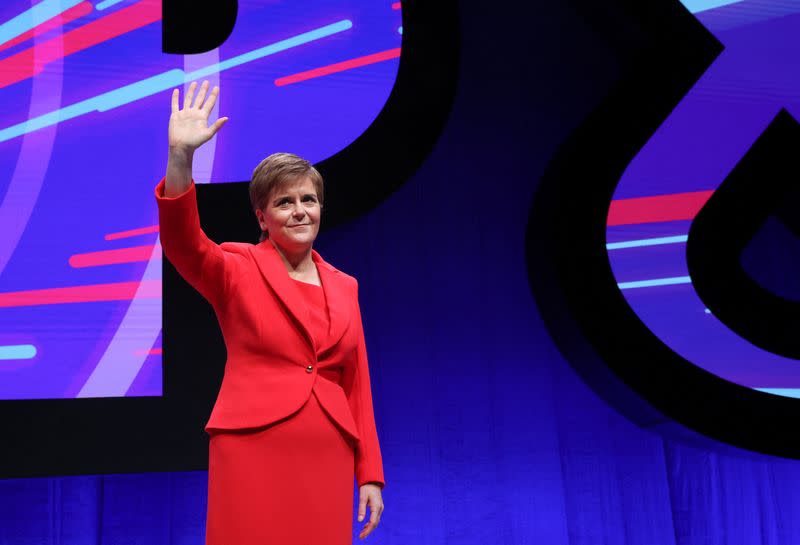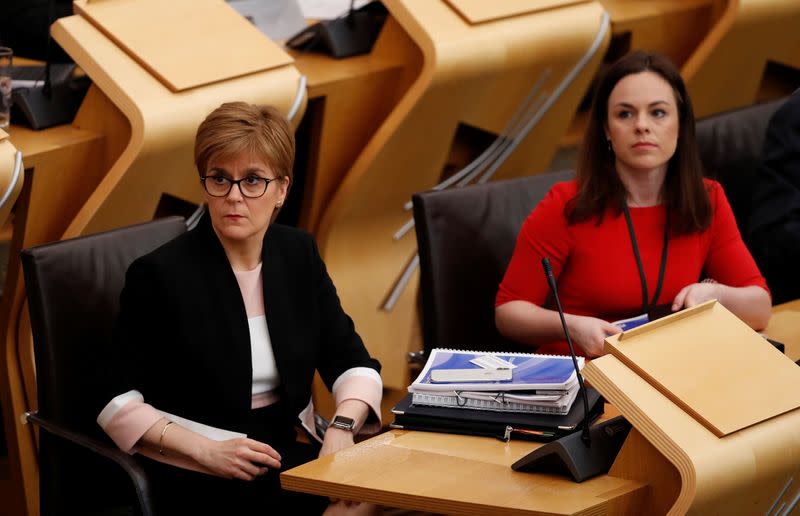Scottish National Party to choose new leader in six weeks
By Alistair Smout
LONDON (Reuters) - The Scottish National Party (SNP) will choose a new leader within six weeks through a ballot of its members, it said late on Thursday, after the surprise resignation of First Minister Nicola Sturgeon.
On Wednesday, Sturgeon said she was resigning as first minister and party leader, saying her dominance over her party and the country was no longer the asset it once was in the fight for an independent Scotland.
The SNP said nominations for the leadership were now open and will close on Feb. 24, while a ballot of its members, who will vote for the next party leader, will open on March 13 and close on March 27.
The party did not set a date for announcing the results of the ballot but said they would be made public "as soon as the result has been determined."
Sturgeon will stay on until the selection of a new leader, who will face major challenges to unite the party on a strategy to find a way forward in its pursuit of independence for Scotland.
Having lost a first independence vote in 2014 by 55% to 45%, a bid by nationalists to hold another one has been blocked by Britain's Conservative government, and polls show Scots remain divided on the issue.
The SNP's special conference planned for March 19 will now be postponed, the party said.
"Democracy is in crisis in the UK right now, but the SNP and Scotland’s future must and will be decided by the ballot box," SNP National Secretary Lorna Finn said.
"It would be wrong to have a newly elected leader tied to a key decision on how we deliver democracy in Scotland in the face of continued Westminster intransigence."
The SNP has not held a leadership contest since 2004, as Sturgeon took over from her predecessor Alex Salmond unopposed in the wake of the 2014 referendum defeat.
Despite the SNP's disappointment at that referendum result, the party has transformed in the last 20 years.
It has run the Scottish government for 16 years, holds 45 of 59 Scottish seats in the Westminster parliament and its membership has increased tenfold to around 100,000.
If the winning candidate is a Member of the Scottish Parliament, then they will almost certainly replace Sturgeon as first minister in the devolved Edinburgh government, where the SNP are the dominant party in a power-sharing agreement with the Greens.
A candidate from the Westminster parliament could stand, although they could not become first minister unless they resigned and ran for the Scottish parliament. The SNP's Westminster leader, Stephen Flynn, has ruled himself out of the running to lead the party overall.
Possible candidates to replace Sturgeon include Kate Forbes, the 32-year-old cabinet secretary for finance, John Swinney, a 58-year-old deputy first minister, and Angus Robertson, a former deputy leader of the party.
(Reporting by Alistair Smout and Sachin Ravikumar; Editing by Alistair Bell)

 Yahoo News
Yahoo News 



